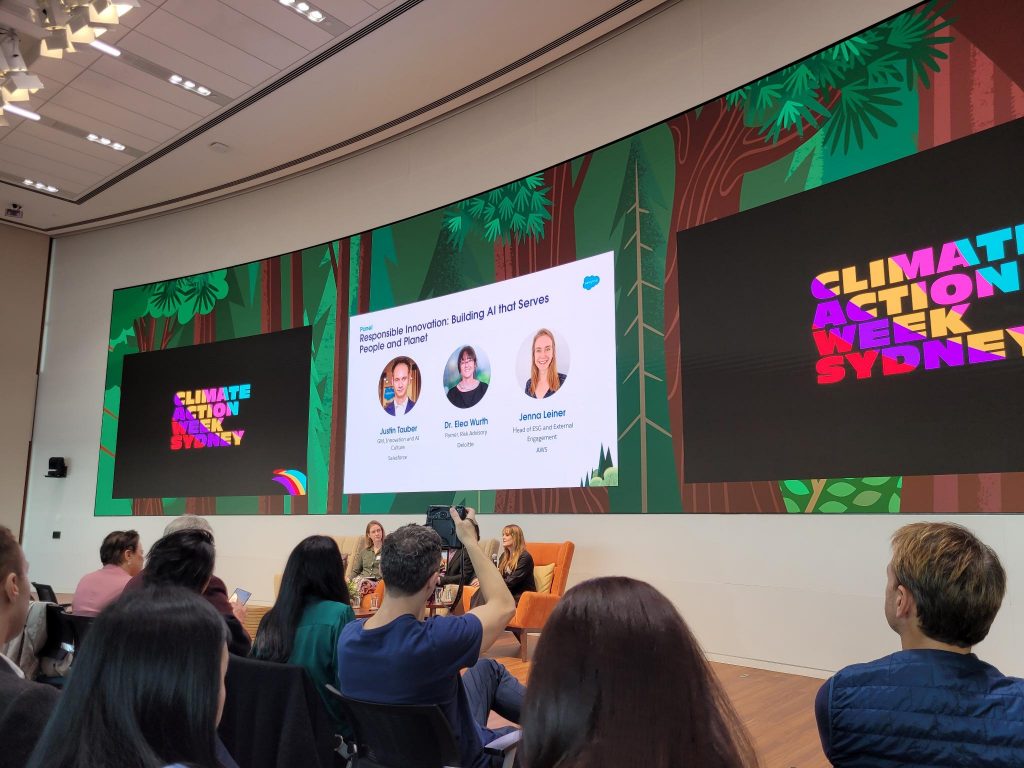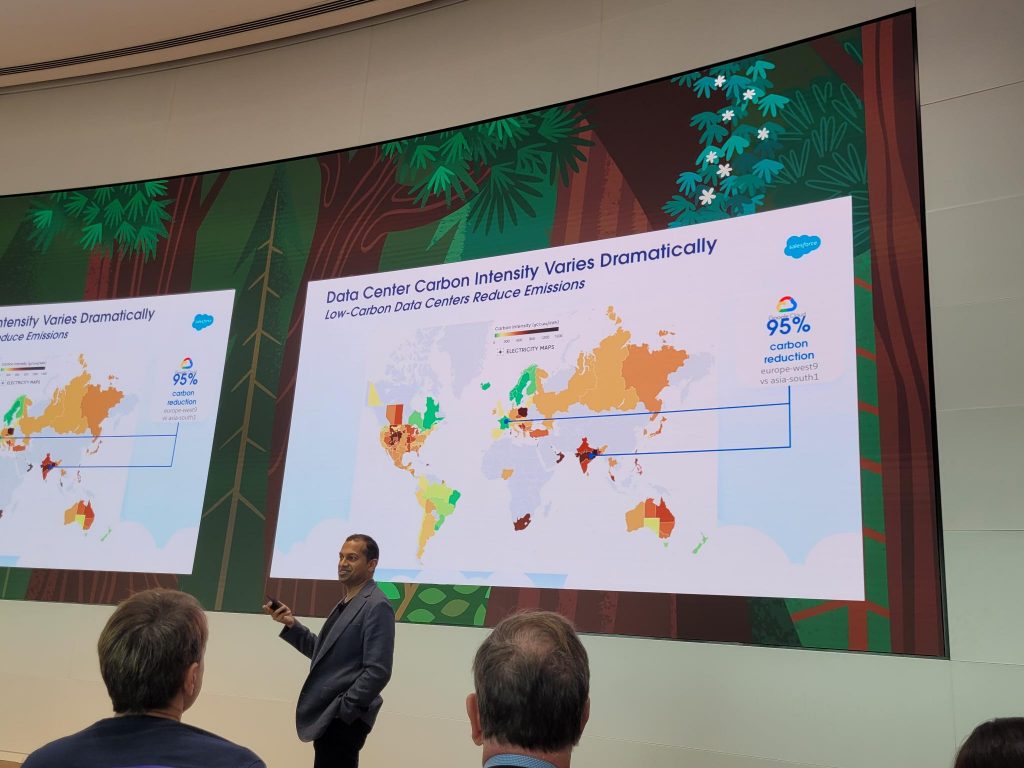Climate and AI Summit Feedback, Sydney – May 2024
I was fortunate to get tickets to the popular Climate and AI Summit at the impressive Salesforce Tower in Sydney during Climate Action Week. We were told it is the most sustainable building in Australia. The venue was packed, and it was actually quite challenging to get tickets. It was a pleasure listening to such smart individuals as Dr. Gayan Benedict, CTO of Salesforce, Sunya Norman, head of Salesforce ESG strategy, Dr. Elea Wurth from Deloitte, Jenna Leiner from AWS, Mark Rowland, COO of Greenhouse, and many others. I felt truly humbled by the high calibre of IQ in the room.

The conference was very informative. It was impressive to see how companies like Salesforce and AWS approach problems scientifically and honestly, rather than trying to hide them. The discussion mainly revolved around how technology, especially AI, has increased the environmental impact, with the hope that AI will also help solve these problems. Everyone in the room agreed that there is a significant problem, one that is exponentially exploding and unsustainable for future generations.
There were also discussions about data integrity, malicious content, regulations, and some solutions presented around coding efficiency, transparency, and democratisation. These solutions aim to enable people to make the right choices and demand better practices. The Salesforce team also announced the Salesforce Startups Accelerator, focusing on climate action, trust, and impact, with $2M in funding for nonprofits to advance climate tech.
I personally disagreed with some of the solutions and have strong evidence that some of the information presented was inaccurate.
Structure of Big Tech Companies
Big tech companies like Salesforce and AWS are not inherently climate-friendly by design. They operate from a highly centralised power structure aiming to maximise profit. As a web pioneer, I’ve seen these companies evolve into enormous and inefficient structures, changing the software market such that small tasks now require enormous infrastructure. For instance, my company, Facenition, developed a face recognition algorithm that operates on a Raspberry Pi with a 4W energy consumption. The same algorithm running on AWS servers would likely consume 4 kilowatts or more. This inefficiency benefits infrastructure providers like AWS, who profit from increased CPU and RAM usage. Other examples could include companies like Google and Facebook, which have developed enormous software frameworks that require thousands of engineers to sometimes perform simple tasks like adding a button to a web page. What could be done in one hour of computing power now requires 10 years of the same computing power (taking into account also the advancement in CPU power available today in contrast to 15 years ago).
Insight 2: Regulation vs. Education
The word “regulation” was frequently mentioned, with hopes that governments will drastically regulate the AI market to prevent malicious use and high environmental impact. As a parent and someone who cares about society, I would rather hear “education” over “regulation,” especially involving big powers like Salesforce. The recent pandemic showed how disastrous government and big money collaboration can be. Cultural change can’t be forced; it must be gradual and gentle, achieved through educating the next generation. Regulations should act as a safety net for extreme bad actors but shouldn’t be the main focus.
Insight 3: Usefulness of Computing Power
Most computing power on Earth is used for either useless activities, like marketing, or harmful ones, like spying and warfare. AI is no exception, often used for unproductive tasks like generating graphics for social media. I point fingers at big tech and their business models, but we all share the blame, including myself. We spend too much time on social media and AI rather than developing medicines, educational software, and robots to improve society. I was unimpressed by the AI application ideas presented, which mainly focused on environmental regulation enforcement. I would prefer to see robots planting trees or solar boats cleaning the oceans rather than additional software to manage carbon taxes.
Energy Measurement Misconceptions
A common mistake at the summit was focusing on energy consumption as a measure for carbon emissions. This assumes that the carbon emitted during power generation accounts for all emissions. Based on my work with Transpower, Meridian Energy, and other large generators in New Zealand as well as a deep tech and AI startup advisor at Helsinki University, I disagree. Dr. Benedict mentioned Salesforce’s attention to geographical carbon emissions, showing that New Zealand and Scandinavia have similar impacts. This data is questionable. While both regions have low carbon emissions at production, Scandinavia has significant carbon output from snow clearing and heating, which New Zealand does not. Hosting a server farm in Finland, for example, results in high carbon output due to the full chain of emissions needed to make the area habitable.

Possible Solutions
As a solution architect, I don’t want to finish my critique without offering some ideas. What could be done?
Decentralising Internet Infrastructure
In an era where each of us has a device and every home has multiple CPUs operating 24/7, decentralising internet infrastructure is not as hard as it may sound. I expect ideas like Uphantom—a peer-to-peer decentralised internet infrastructure which I was involved in its invention—to emerge in the coming years.
Measuring Environmental Impact
Regarding measuring environmental impact without just looking at input/output at generation, a talented scientist, maybe a physics student, could definitely build a more accurate model. Why wouldn’t AWS or Salesforce in Sydney sponsor such a project, perhaps in collaboration with UTS?
Salesforce Climate Action Incubator
I don’t believe that non-profitable startups have a sustainable future—this is not “innovation” but “charity.” A startup need to be so innovative that it passes the market validation test. $2M is what one good startup should be funded with, not an entire incubator. If Salesforce wants to lead the industry, they should fund a $100M incubator. This incubator should be executed not as a charitable organisation but as a proper innovation hub, ideally run by organisations like Greenhouse or similar, and pointing to solve the bigger problems mentioned above.
Focus on Education
Salesforce and AWS could invest more in education and perhaps collaborate with educational organisations to generate some innovative ideas. It will be more useful for our society than pushing all sort of regulations forward.
——————————–
Eran Ben-Shahar is a Sydney based experienced IT/AI Startups CTO, Solution Architect and Team Leaders. Except several successful businesses I served 7 years for NEw Zealand Transport Agency as a senior enterprise application specialists and 2 years at New Zealand Parliament as a senior Business Analyst. I currently look for an interesting hybrid role.



